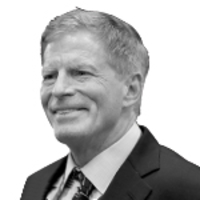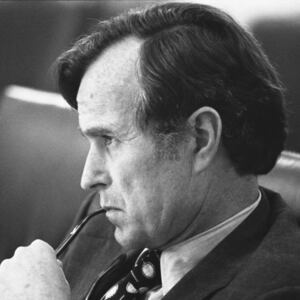I’ve never been fond of the use of “passing” to describe death. It seems, well, overly optimistic and an effort to deny that death is death.
But in the case of George H.W. Bush, passing seems all too fitting. With his death so much seems to have departed. To many of us drawn to his side, President Bush represented the heart and soul of a basic decency that transcended any issue of the moment. Humble, kind, blessed with a quiet courage that defined a generation, his life always reminded us that character is destiny.
Courage is not standing up to a bullying buffoon like Trump; courage is Lieutenant Bush staying in the cockpit of his torpedo bomber with a burning engine until he completes the mission. With a squadron that suffered a casualty rate of more than 300 percent, Bush flew 58 combat missions and was awarded the Distinguished Flying Cross and three air medals.
But today most of the Republican Party lacks the basic courage to stand up to Trump for even the most fundamental values it long advocated as core beliefs. In this Trump party, character doesn’t count. Personal responsibility is a sucker’s game. We are Putin’s partner. The national debt doesn’t matter. Should I go on?
No Republican was ever asked in a debate if President H.W. Bush should be a role model. The question would have been as absurd as asking if gravity was a regional phenomenon. It was a given, a compact of trust between a leader and his party and his country. Today that trust has been shattered.
When I think of George H.W Bush, I think of my father and so many like him. He was in the South Pacific not far from where Lieutenant Bush was shot down. Like Bush, he came back from the war and threw himself into life—a career, a community, a family—and rarely spoke of his three years in the South Pacific. It was only when listening to an oral history interview recorded by the World War Two Museum did I learn he had participated in 28 island D Day landings. It was only in the latter years of his life did he confide that he left the FBI and joined the Navy after being ordered by J. Edgar Hoover to round up Asian Americans. “You can always say no,” he said.
“No” is what George H.W. Bush told the NRA when he resigned after the group’s then vice-president, and later president, Wayne LaPierre called federal agents “jack-booted thugs.” In his resignation letter Bush wrote, “Your broadside against Federal agents deeply offends my own sense of decency and honor; and it offends my concept of service to the country.”
Today it is unimaginable that our president would ever refer to a personal sense of decency or honor. It would be less ludicrous for him to appear in a nun’s habit and announce he was dedicating his life to serving others. The chasm between the two is endless and unmappable.
In George H. W Bush’s world, being an American was a great privilege that came with responsibility. To be an American was to know you were among the most fortunate in the world, heirs to a legacy many had died defending and that must be defended. In Donald Trump’s world, being an American means we are being cheated by powerful forces in the world playing America for a sucker. Trump’s America is a country of victims looking to settle the score; it is weak people who need a Strong Man to stand up to those determine to take advantage of our decline. Who else can stand up to Canada if not Donald Trump? To be kind is to be weak. To forgive is to lose. Compassion is capitulation. The world must be at our feet or it will be at our throat. In life, Donald Trump has neither equal partners nor real friends and so he sees the same in America’s role in the world.
How different is Trump’s Republican party from Bush 41’s? George H. W Bush signed the Americans With Disability Act in 1991. Donald Trump mocks the disabled. George H. W Bush summoned a coalition of 35 countries for the first Gulf War. Donald Trump attacks even our closest allies, England and Canada, and talks about NATO like it was a deadbeat tenant. President Bush negotiated the original North American Free Trade Agreement. Donald Trump calls Mexicans “rapists” and brags he has ordered armed U.S. troops to respond with deadly force to brown people throwing rocks at the border. George H. W. Bush celebrated charity and kindness. Donald Trump mocks a “thousand points of light.” George H. W. Bush enlisted at 18, the Navy’s youngest pilot, in civilization’s last great battle against tyranny. Donald Trump dodged military service multiple times, celebrates tyrants and defends Nazi’s as “good people on both sides.”
To ask what is lost when a country is led by a man who mocks prisoner of war heroes and talks publicly about “what a great body” his daughter has and how if he wasn’t married and her father he’d “probably be dating her” is to remind ourselves what it was like when there was a president who aspired to represent the best of our national heart.
George H. W. Bush was far from perfect and would be the first to insist he was a flawed man who had made mistakes. But he never stopped challenging himself and others to be bigger than the moment, to rise above pettiness and anger and face the world with humility and grace.
In 2000, as part of the George W. Bush campaign, I spent time at Kennebunkport for debate prep and filming. At the end of the second day, the former president seemed to know each film crew member’s name and was asking about kids and arguing the evils of designated hitter rules with a baseball fanatic cameraman. He scolded me for not visiting the World War Two Museum in New Orleans, even though it had only opened a few weeks earlier. “You have to go with your dad,” he told me. Later, I did. It was easy to forget that you were with a man who had led a nation, fought in war and sent others to war; a man who had lived a life larger than life while still seeming to be shrouded in normalcy.
One day, I came back from an early morning run and found him standing near the water, looking out at the rising sun of a new day. I stopped, feeling like I was interrupting, and turned to walk quietly away. “Hey,” he said, “It’s going to be a hell of a nice day.”
And so it was. That’s how I will always remember him: a tall man facing a new day with a goofy smile and optimism. We have lost so much.






